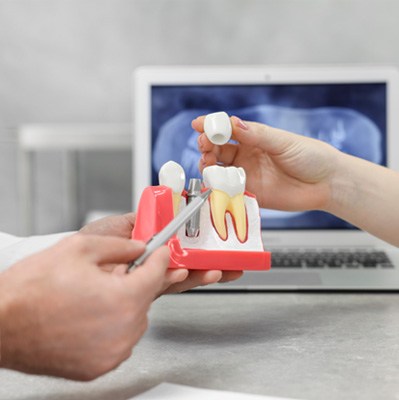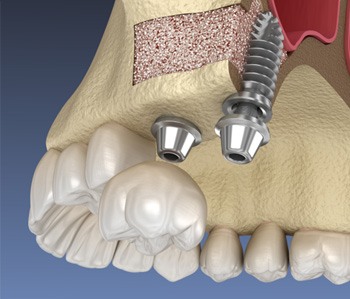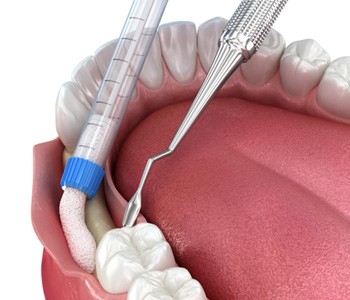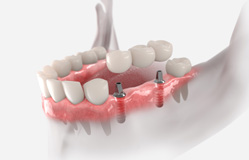Dental Implants – Worcester, MA
Permanent Tooth Replacement You Can Trust
Replacing missing teeth has been a key component of the field of dentistry since it first began, but dental implants are far and away the closest that dentists have come to recreating your lost teeth. Unlike traditional dental bridges and dentures, dental implants replace the tooth roots that are embedded in the jawbone. As a result, this solution looks, feels, and functions like your original teeth did. Plus, they can last for several decades, maybe even a lifetime! To learn more about how dental implants from our Worcester, MA dentist can complete your smile, contact our team at Winthrop Street Dentistry today!
Why Choose Winthrop Street Dentistry for Dental Implants?
- Entire Dental Implant Treatment Completed in One Location
- Modern Technology For Comfortable Care
- Flexible Dental Financing Options Available
What are Dental Implants?

A dental implant is an artificial tooth root that is made from biocompatible materials, usually titanium or zirconia. The post is surgically inserted into your jaw where the root of your lost tooth used to be. Then, it merges with the surrounding bone tissue, forging a direct bond that allows the implant to support a dental crown, bridge, or denture on top of it. Once this process is complete, you can look forward to a replacement tooth that is indistinguishable from your natural pearly whites in almost every way.
The 4-Step Dental Implant Process

Dental implants offer a lasting, natural-looking solution that can restore your smile’s health, function, and confidence for decades. At Winthrop Street Dentistry, our knowledgeable team is here to guide you through each step of the journey with clarity and support, so you can move forward with confidence. Keep reading to explore the four key stages of the dental implant process.
Initial Dental Implant Consultation

The first step in the dental implant process is attending your consultation with us! Our knowledgeable dental team will be able to determine if dental implants are a viable solution for your situation. During this visit, we’ll closely examine your mouth and facial structures, review your medical history and determine if your jaw has a sufficient amount of density to support implants. In some cases, patients might need a dental bone graft to address a lack of jawbone density. Other preparatory procedures include things like periodontal therapy or even possible tooth extractions. In any case, once we’ve cleared you for implants, we can schedule your surgery and get the ball rolling!
Dental Implant Surgery

We’re fortunate to be able to complete the entire dental implant process in-house thanks to the efforts of our skilled team! This means you won’t have to deal with the hassle of coordinating with other offices, which ultimately saves you a great deal of effort. And better yet, the actual surgery itself is a relatively straightforward process. First, your mouth will be thoroughly numbed before small incisions are made in your gum tissue to access the jawbone. Then the implants are precisely placed directly into the jawbone, and the gums are sutured shut. A protective cap is placed over the posts to protect them as they heal and to help your gums maintain the correct shape.
Dental Implant Osseointegration & Abutment

On average, it’ll take anywhere from three to six months for the implant posts to naturally fuse with the jawbone; this process is referred to as osseointegration, and it’s the single most important factor that contributes to the future success of your dental implants. If your implant posts cannot successfully fuse with your jaw, they will inevitably loosen and fail prematurely. That said, be sure to follow the detailed aftercare instructions provided by your oral surgeon during this step. Once the implant posts have fuses, you’ll have to come back for a second (and smaller) surgery to receive your abutments, which go on top of your implant posts. These connector pieces allow your final customized restoration to sit in the correct position.
Delivery of Dental Implant Restoration(s)

You can rest assured that your restoration(s) will be designed based on exact impressions of your smile, meaning that once your replacement teeth are ready to go, they’ll look and feel just like your natural pearly whites! We’ll call you back to attach them to the abutments once they’re ready, and when we’ve placed them, we will inspect them to make sure that your bite looks and functions like normal. We’ll make any needed adjustments and send you on your way with a newly rebuilt smile!
Advanced Dental Implant Procedures

Initially, if you aren’t an ideal candidate for dental implants, it does not mean that you’ll never be able to get them – sometimes, a patient’s jaw just needs a little extra help to accommodate implants! In these cases, our team might utilize one of a few different advanced dental implant procedures before placing your posts. Though they might lengthen your overall treatment process, if deemed necessary, they ultimately ensure the lasting, lifelong success of your implants. Here are just a few examples of the advanced procedures we may need to use to prepare you for your new smile.
Bone Grafting

Perhaps the biggest factor related to ensuring a successful dental implant placement is the patient’s jawbone density. After dental implants are placed, they need a sufficient amount of bone tissue to fuse with to truly function as replacement tooth roots. Unfortunately, patients who’ve been without teeth for extended periods often suffer from weaker, less dense jawbone tissue.
For patients in this camp, a bone graft is usually needed to fortify the area where the implants are being positioned. Bone minerals are used from another part of your body or a donor source. Once the new bone has integrated, you’ll be ready for your dental implants.
Sinus Lift

In some situations, dental implants must be placed toward the back of the mouth, in the upper arch. However, if there isn’t enough bone tissue to support the implant, it might protrude into the sinus cavity. In these cases, a special type of bone graft called a sinus lift might be required to ensure that the sinus cavity has enough space to hold the implant in place.
A small window is made in the jawbone, and the membrane of the sinus cavity is gently lifted so that the newly empty space can be filled with grafting material, essentially thickening this part of the jaw and gently moving the sinuses so they won’t be damaged by the implant placement. Like regular bone grafts, it takes time for the mouth to fully heal.
Ridge Expansion

The ridge bone is the part of the jaw that surrounds and supports the teeth themselves, and if this bone is too narrow as a result of bone loss, dental implants might not be viable yet. With ridge expansion, we can ensure that this bone is wide enough to comfortably support your dental implant posts.
We’ll separate the ridge bone into inner and outer segments, carefully inserting the grafting material into the space between them. This effectively widens the jaw and grants us the space needed to place your posts and ensure the tissue can properly heal.
Benefits of Dental Implants

Dental implants have quickly become the gold standard of tooth replacement; in fact, over half a million of these awesome restorations are placed annually, meaning that many patients are gaining access to all of the benefits they have to offer. The uniquely comprehensive structure of dental implants gives them multiple advantages over conventional tooth replacement options. Keep reading to learn a little more about how dental implants in Worcester can ultimately restore your smile and dramatically improve your quality of life!
Day-to-Day Benefits

Teeth are important for numerous reasons, but many of them have to do with day-to-day oral functionality. Here’s how dental implants can vastly improve your daily life:
- Restored biting power – Since dental implants replace the entire structure of missing teeth, they restore their ability to bite and chew food. Therefore, patients can eat virtually all of their favorite foods!
- Enhanced speech – It’s common for patients with dentures to have trouble speaking, but since dental implants are secured via posts embedded in the jawbone, you don’t have to worry about them sliding around your mouth and affecting your speech.
- Easy to clean – You don’t have to take dental implants out to soak them in a special cleaner or do anything different when it comes to oral hygiene; they’re very simple to care for!
- Unparalleled confidence – Your smile is the first thing that strangers notice about you; needless to say, the beautiful, complete smile that dental implants will grant you is certain to work wonders for your self-esteem and draw others toward you.
Health Benefits

Implants can also provide you with many noteworthy oral health benefits, including:
- Protection for surrounding teeth – Dental implants serve as placeholders to ensure that your remaining natural teeth stay put, and you won’t have to worry about them sustaining any damage. It’s worth noting that traditional restoration options can sometimes place excess strain on the surrounding teeth and gums due to how they’re stabilized.
- Jawbone preservation – Implants provide the jaw with an enormous level of healthy support and stimulation since they emulate tooth roots, which in turn helps to prevent the bone resorption that commonly follows tooth loss.
- Improved overall health – Research shows a relationship between tooth loss and a heightened risk of several diseases. Since implants are the next best thing to your natural teeth, it’s reasonable to assume that they help to lower these risks. Not to mention, patients with dental implants often find it easier to care for their new smile since they’re extra motivated!
Long-Term Benefits

When you get dental implants, you’re investing in a solution that is made to last. This awesome solution is accompanied by many unique long-term benefits, such as:
- Impressively high success rate – Dental implants boast an incredible success rate of 95% - 98%, even after 10+ years!
- Extraordinary lifespan –Unlike dentures or bridges, implants can easily persevere for several decades if they’re properly maintained. This also means they’re cost-effective since they won’t need to be replaced!
- Youthful appearance – Dental implants prevent your jaw from deteriorating, which can lead to facial collapse and an undesirable appearance that makes you look older. By negating this issue, they restore a more youthful look to your face!
Who Dental Implants Can Help

Thanks to remarkable advancements in the field of dentistry, more people are eligible for dental implants than ever before. So, if you are missing one tooth, several teeth, or an entire arch, and you’re interested in this state-of-the-art tooth-replacement option, you shouldn’t hesitate to schedule an appointment at our Worcester dental office. In the meantime, you can read on to learn more about who dental implants can help!
Who Is a Good Candidate for Dental Implants?

We mentioned above that many adult patients are candidates for dental implants. The reality is that if you’re an adult who has lost one or more teeth, your jawbone is strong enough to support a dental implant, and you’re generally in good health, chances are that this cutting-edge tooth-replacement option is for you! Depending on your specific circumstances, we may need to provide preliminary care, like gum disease treatment, but don’t worry – we can devise a treatment plan designed to give you a full, functional smile again.
Missing One Tooth

To fill a single gap in your smile, we place one dental implant post vertically into the space where the tooth’s roots once were. After the post has integrated with your jawbone, we install a metal abutment connector on top, which is then used to secure a custom dental crown. This solution is much more conservative than a traditional dental bridge, which requires some of your healthy tooth structure to be removed. Plus, it lasts longer (dental implants are known for lasting 30+ years with proper care!).
Missing Multiple Teeth

If you are missing multiple teeth, we have a few options. For instance, we can bring back several consecutive missing teeth by placing an implant at either end of the gap and anchoring a dental bridge onto them. If you’re missing multiple teeth at various locations in your mouth, a small number of implants can be placed throughout an arch to secure a partial denture. Since these restorations are self-supporting, they don’t require any of your remaining teeth to be modified either!
Missing All Teeth

Are you missing every tooth in an arch? Maybe you don’t have any of your natural teeth left. Instead of dealing with an unreliable denture that sits on your gums, you can enjoy a more lifelike solution by having your denture attached to dental implants. In most cases, four to six implant posts are enough to provide support for a full denture. Depending on your needs and preferences, implant dentures can be either fixed or removable. They also won’t slip around, so you’ll be free to enjoy a varied diet with ease.
Understanding the Cost of Dental Implants

Our team at Winthrop Street Dentistry will do everything we can to make understanding the cost of dental implants easy – from providing you with an estimate at your consultation to reviewing the financial solutions we offer. If you want to learn more on the topic ahead of time, you’ll be happy to know that we’ve also dedicated this next section to covering the factors that impact the cost, whether or not dental insurance covers a portion of it, and more.
Preliminary Treatments & Dental Implant Surgery

Whether you lost a tooth due to gum disease or an unavoidable accident, we can’t always place a dental implant right away. Sometimes, preliminary treatments (i.e., periodontal therapy, tooth extractions, bone grafting) are necessary. Although these do come with an additional cost, they are also often covered by dental insurance, which will help keep your out-of-pocket expenses more affordable.
Of course, the implant surgery itself is a separate cost. The good news is that we offer the entire dental implant treatment at our office, which saves you from multiple bills from different practices (not to mention the time and money you spend on gas, coordinating appointments, etc.).
The Parts of Your Dental Implant

When creating your treatment plan (and pinpointing the cost), we’ll need to determine:
- The number of implants needed
- The type of restoration used to restore the visible portion of your smile
- The material used to craft your implant (ex: zirconia)
- The implant manufacturer your dentist uses
As always, if you have any questions for our team about why we recommend a certain restoration or why we use our implant manufacturer, you’re more than welcome to ask! We’d be happy to answer any questions you have when it comes to something as important as rebuilding your smile.
How Dental Implants Can Save You Money

It’s important to note that dental implants tend to cost more than dentures and bridges. Because of their longevity, though, they can actually pay for themselves in the long run. While bridges and dentures only last for about 10 years on average, dental implants can last three or four times that long. You won’t have to spend money on replacing your prosthetic – not to mention maintenance products like adhesives. In the end, dental implants are easily worth their weight in gold!
Does My Dental Insurance Cover Dental Implants?

Sometimes, dental insurance providers do cover a portion of the cost, like the restoration. As always, we recommend reading through the fine print on your plan or reaching out to your provider directly to learn more about your benefits ahead of time. At your consultation, our Worcester dental team will also review your coverage with you and answer any questions you have so the process of utilizing your available benefits isn’t stressful in any way. For the same reason, we’ll handle the claims and paperwork on your behalf!
Making Dental Implants Affordable

If you don’t have dental insurance, we will review our other financial solution: flexible financing. We’re proud to work with CareCredit, which is a trusted third-party financier that millions of patients have used over the years. It’s quite simple: you choose the payment plan that works best with your monthly budget, allowing you to space-out your payments into smaller, more manageable chunks. There are even some payment plans with little-to-no interest attached too!
Dental Implants Post-Op Instructions

Since we can complete the entire dental implant process here at our Worcester office, you’ll end up saving quite a lot of time, money, and effort. However, once we’ve finished your procedure, it falls mostly on you to ensure that your mouth can heal properly. Don’t worry, though—we’ll help you out! We’ll provide you with specific instructions and guidelines to follow after your implant placement to make your recovery as smooth as possible. In the meantime, here’s some additional information about what to expect directly following your surgery and how to ensure your recovery is pleasant and productive.
What to Do Directly After Dental Implant Surgery

The key to healing successfully after dental implant surgery is to protect the blood clots that form over your surgical sites. You shouldn’t touch or disturb these clots or the surrounding gum tissue, since this can disrupt the healing process. Be sure to avoid using a drinking straw, since the suction can prove problematic. Likewise, refrain from smoking and using tobacco products.
Common Side Effects When Recovering from Dental Implant Placement

If you’ve never undergone oral surgery before, it can be tricky to tell what sort of symptoms are normal and which ones warrant attention. While you may feel mild discomfort or soreness for the first few days, be sure to give us a call if things persist or worsen. In most cases, a few common side effects aside from discomfort include swelling in the gums and intermittent bleeding, both of which can be alleviated with cold compresses and gauze with gentle pressure, respectively.
Your Diet After Dental Implant Surgery

After your procedure, you’ll want to stick to soft foods and liquids for the next few days to avoid interfering with your mouth’s healing. It’s wise to stock up your fridge and pantry with these easy-to-eat items beforehand:
- Pudding, yogurt, and Jell-O
- Scrambled eggs and mashed potatoes
- Ice cream, smoothies, and protein shakes
- Soft-boiled pasta and rice
- Oatmeal and porridge
Post-Op Health & Oral Hygiene

Your dental implants have the potential to last for a lifetime if you take excellent care of them. Fortunately, caring for dental implants isn’t too difficult at all, but while you’re healing up, you’ll need to keep a few things in mind:
- Brush your teeth like normal, but be extra careful and gentle when scrubbing near the implant site(s).
- Carefully rinse with salt water three times each day, especially after your meals. Rather than spitting out the water, let it pour from your mouth into the sink.
- Do not use any mouthwashes containing alcohol, since this can cause intense discomfort.
What to Do After Your New Teeth Are Attached

After you’ve made your recovery and your implant posts have fused with your jawbone, we’ll be able to finally place your custom-made restoration, which is designed to perfectly mimic your natural teeth in terms of look, feel, and function. This part is quick and painless, but if you do end up feeling mild sensitivity, you should be able to manage it with over-the-counter pain relievers. If you notice any bleeding or swelling, be sure to let us know right away so we can address it.
Maintaining & Caring for Your Dental Implants

Dental implants are a remarkable form of tooth replacement. In fact, they have the potential to provide you with a lifetime of benefits! However, they can only do that if you take some simple steps to protect them against damage and infections. What specific actions should you take? Continue reading to find some practical advice.
Make Oral Hygiene a Priority

Infection is the leading cause of dental implant failure. Fortunately, thorough oral hygiene can do much to fight harmful bacteria and keep infections away. You should:
- Thoroughly brush your teeth at least twice a day.
- Floss or use other means to clean between your teeth at least once a day.
- Follow hygiene instructions that are specific to your dental implant restoration. For example, you might need to clean underneath a bridge or remove an implant denture for proper cleaning.
Eat a Healthy Diet

Dental implants provide a strong bite force, so you should feel free to consume all of your favorite snacks, meals, and treats. However, it is also important to keep in mind that, just like natural teeth, some foods are better for dental implants than others. Avoid overindulging in hard, sticky, sugary and highly acidic foods. Instead, center your diet on nutrient-rich options that support oral health. Calcium, vitamin D and vitamin C are all important.
Break Bad Habits

Smoking is a bad habit that can wreak havoc on your oral health and significantly increase the risk of dental implant failure. You should make every effort to kick the habit. Your primary care practitioner may be able to provide resources to help you do so.
Another bad habit is that of biting down on hard objects, such as ice or pen caps, as well as using your teeth as tools. Remember, your implants are strong but not invincible! They can break if they are exposed to too much force.
Protect Your Dental Implants

Depending on your circumstances, you might need to wear a mouthguard sometimes.
- For athletes, a sports mouthguard can prevent damage to both your oral tissues and your dental implants. Custom mouthguards from a dentist are superior to over-the-counter options.
- If you grind your teeth at night, you might need a special mouthguard to place a barrier between your upper and lower teeth and prevent them from harming one another.
Schedule Regular Dental Checkups

It should be your custom to visit our team every six months for a cleaning and checkup. During these appointments, we will:
- Clean and examine your natural teeth.
- Check your dental implants for signs of damage.
- Clean your implant abutments.
- Give you advice to help you maintain a healthy mouth.
- Recommend necessary treatment if we notice any developing problems. Very often, we are able to prevent issues from becoming severe and threatening the well-being of dental implants and the surrounding tissues.
Dental Implant FAQs

Whether you just started researching dental implants in Worcester or you’ve been considering this tooth-replacement solution for several months now, it’s natural to have questions. Luckily, our knowledgeable team is here to make finding the answers as simple as possible. Have a specific question on your mind? Then don’t hesitate to get in touch with our team to schedule a consultation. Want to learn more about dental implants in general? Then keep reading to learn the answers to some of the most frequently asked questions we hear from patients.
How Long Do Dental Implants Last?
Dental implants come with numerous benefits, including their lifelike look and their ability to replace both the root and crown of the missing tooth. Of course, one of the biggest draws is that they can last for several decades. Some even last more than 30 years! The best way to prolong the lifespan of yours is by following a solid oral hygiene regimen, getting dental checkups and cleanings every six months, eating mostly well-balanced, nutrient-dense meals, and steering clear of unhealthy habits, like smoking.
What Can Cause Dental Implants to Fail?
Although dental implants have an impressive 95% success rate, it is possible for them to “fail” in the short and long term. Most often, it’s the result of peri-implantitis (a form of gum disease) or failed osseointegration (when the implant doesn’t integrate with the jawbone). However, chronic teeth grinding, tobacco use, and poor oral hygiene are other factors that can play a role. Don’t worry – our implant dentist in Worcester will review all of these and more during your consultation to ensure you know what to do and what not to do when it comes to keeping your dental implant in pristine condition.
How Can I Tell If My Dental Implant Is Failing?
Dental implant failure is usually accompanied by severe pain, inflammation, and swelling. It may also feel loose or like it’s going to fall out. Since it’s better to err on the side of caution, reach out to your dentist if any unusual symptoms arise.
Can I Get Dental Implants If I Smoke?
Smoking won’t automatically disqualify you. However, since smokers have a higher rate of dental implant failure, it’s something your implant dentist will take into serious consideration. If you are a candidate, then you will need to refrain from tobacco use for at least two weeks before the procedure and at least two to three months afterward.
Will People Be Able to Tell That I Have Dental Implants?
Dental implants are incredibly realistic, so there is a good chance that even your closest friends and family won’t be able to tell a difference! There are a few reasons for this. To begin, dental implants replace the root and crown of the tooth, ensuring there isn’t any unnatural movement when you chew, smile, speak, or laugh. Secondly, dental implants are custom-made for each patient, which means they won’t look obtrusive or bulky in any way. Lastly, they are available in a wide range of lifelike shades, so they will blend in with your existing smile flawlessly.



